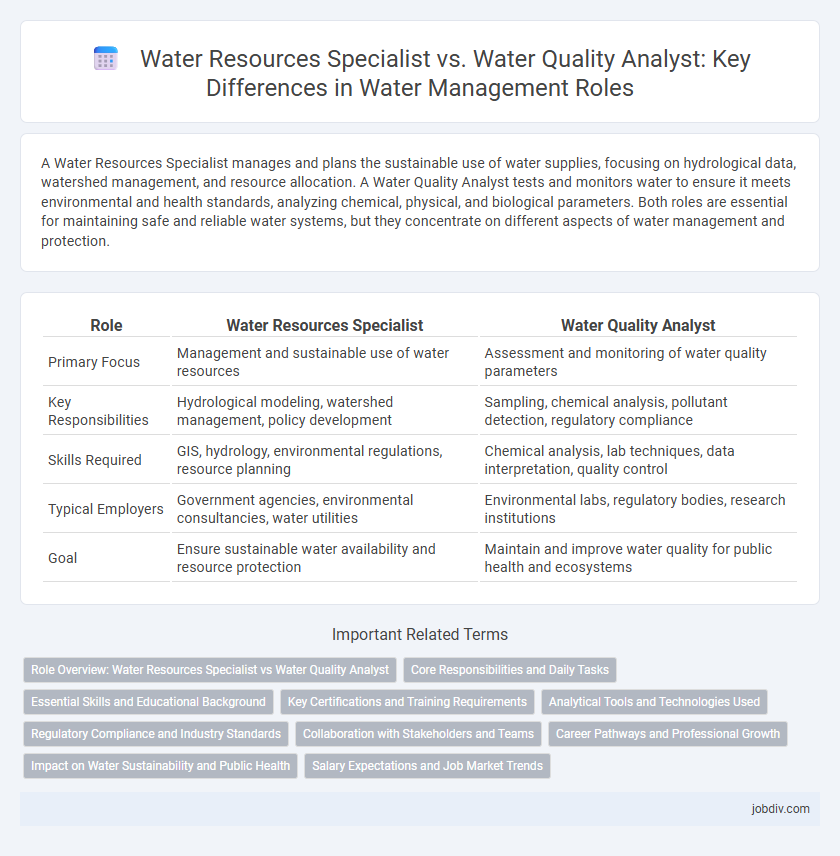A Water Resources Specialist manages and plans the sustainable use of water supplies, focusing on hydrological data, watershed management, and resource allocation. A Water Quality Analyst tests and monitors water to ensure it meets environmental and health standards, analyzing chemical, physical, and biological parameters. Both roles are essential for maintaining safe and reliable water systems, but they concentrate on different aspects of water management and protection.
Table of Comparison
| Role | Water Resources Specialist | Water Quality Analyst |
|---|---|---|
| Primary Focus | Management and sustainable use of water resources | Assessment and monitoring of water quality parameters |
| Key Responsibilities | Hydrological modeling, watershed management, policy development | Sampling, chemical analysis, pollutant detection, regulatory compliance |
| Skills Required | GIS, hydrology, environmental regulations, resource planning | Chemical analysis, lab techniques, data interpretation, quality control |
| Typical Employers | Government agencies, environmental consultancies, water utilities | Environmental labs, regulatory bodies, research institutions |
| Goal | Ensure sustainable water availability and resource protection | Maintain and improve water quality for public health and ecosystems |
Role Overview: Water Resources Specialist vs Water Quality Analyst
A Water Resources Specialist focuses on managing and developing sustainable water supplies, incorporating hydrological data and environmental impact assessments to optimize water distribution and conservation strategies. Conversely, a Water Quality Analyst specializes in monitoring and analyzing water samples to ensure compliance with health and environmental regulations, using laboratory techniques to detect pollutants and assess water safety. Both roles are critical in maintaining the integrity of water systems but emphasize resource management versus contaminant analysis.
Core Responsibilities and Daily Tasks
Water Resources Specialists manage and develop sustainable water systems by analyzing hydrological data, planning water supply and distribution networks, and ensuring compliance with environmental regulations. Water Quality Analysts focus on monitoring and testing water samples, identifying contaminants, and interpreting laboratory results to maintain safe drinking and ecosystem water standards. Both roles require expertise in environmental science but differ in scope: resource management versus analytical assessment.
Essential Skills and Educational Background
Water Resources Specialists require expertise in hydrology, environmental science, and GIS technology, with strong skills in data analysis and resource management, typically holding degrees in environmental engineering, hydrology, or natural resource management. Water Quality Analysts focus on chemistry, microbiology, and toxicology, possessing skills in laboratory testing, water sampling, and regulatory compliance, often earning degrees in environmental science, chemistry, or biology. Both roles demand proficiency in interpreting scientific data and understanding water regulations, but Water Resources Specialists emphasize system-level water resource planning while Water Quality Analysts concentrate on monitoring and ensuring the safety of water supplies.
Key Certifications and Training Requirements
Water Resources Specialists typically require certifications such as Professional Hydrologist (PH) or Certified Water Resources Specialist (CWRS), and training in hydrology, watershed management, and environmental regulations. Water Quality Analysts often need certifications like Certified Water Quality Analyst (CWQA) or Certified Environmental Scientist (CES), along with training in laboratory techniques, chemical analysis, and environmental compliance. Both roles benefit from knowledge of EPA standards and proficiency in data analysis software related to water resource management and quality assessment.
Analytical Tools and Technologies Used
Water Resources Specialists utilize Geographic Information Systems (GIS), remote sensing technologies, and hydrological modeling software to assess water availability, distribution, and management strategies. Water Quality Analysts rely heavily on chromatographs, spectrophotometers, and automated sampling devices to detect and quantify contaminants in water samples. Both roles employ advanced data analytics platforms to interpret environmental data, but their tools are specifically tailored to their unique focus areas within water science.
Regulatory Compliance and Industry Standards
Water Resources Specialists manage the sustainable allocation and conservation of water supplies, ensuring compliance with regulatory frameworks such as the Clean Water Act and state water rights laws. Water Quality Analysts focus on monitoring and analyzing water samples to detect contaminants, adhering to industry standards like EPA guidelines and ISO 17025 certification for laboratory testing. Both roles require strict adherence to environmental regulations to safeguard public health and maintain ecosystem integrity.
Collaboration with Stakeholders and Teams
Water Resources Specialists collaborate closely with engineers, environmental agencies, and community planners to develop sustainable water management strategies, ensuring efficient allocation and conservation of water resources. Water Quality Analysts work alongside laboratory technicians, regulatory bodies, and public health officials to monitor pollutant levels, analyze contaminant data, and maintain compliance with environmental standards. Both roles require effective communication and teamwork to address complex water challenges and implement integrated solutions for safe and reliable water systems.
Career Pathways and Professional Growth
Water Resources Specialists focus on managing and conserving water supplies, developing sustainable usage plans, and addressing watershed management, which opens career pathways in environmental consulting, government agencies, and infrastructure development. Water Quality Analysts concentrate on monitoring and analyzing water pollutants, ensuring regulatory compliance, and conducting laboratory testing, leading to roles in environmental laboratories, regulatory bodies, and public health sectors. Both career paths offer professional growth through specialization, advanced certifications, and interdisciplinary collaboration in environmental science and policy.
Impact on Water Sustainability and Public Health
Water Resources Specialists concentrate on managing and preserving water supply systems to ensure sustainable availability, directly influencing long-term water sustainability through watershed management and resource allocation. Water Quality Analysts focus on monitoring chemical, physical, and biological parameters of water bodies to detect contaminants and safeguard public health by preventing exposure to harmful pollutants. Both roles are critical in maintaining balanced ecosystems and delivering safe drinking water, thereby reducing disease risks and supporting environmental resilience.
Salary Expectations and Job Market Trends
Water Resources Specialists typically command higher salaries due to their expertise in managing hydrological systems and infrastructure projects, with median annual earnings around $75,000. Water Quality Analysts, focusing on monitoring and assessing water contaminants, generally earn slightly less, averaging approximately $65,000 per year. Job market trends indicate growing demand for Water Resources Specialists as climate change drives the need for sustainable water management, while Water Quality Analysts remain critical for regulatory compliance and environmental protection.
Water Resources Specialist vs Water Quality Analyst Infographic

 jobdiv.com
jobdiv.com